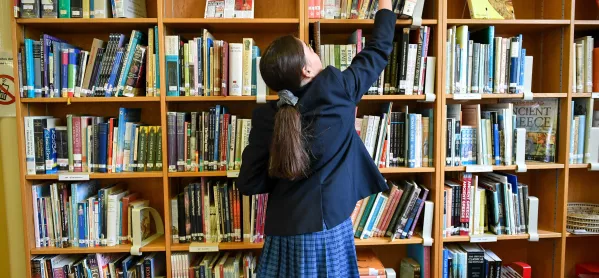Schools with disadvantaged intakes are more than twice as likely to have no access to a designated library space than those with more advantaged pupils, research reveals.
The findings have led to one children’s author dubbing inequality of access to school libraries a “social mobility time bomb”.
One in eight schools - 13 per cent - do not have access to library space, according to the report commissioned by the Great School Libraries campaign, run by CILIP, the library and information association, and the School Library Association.
Related: ‘We must not deprive our children of school libraries’
Opinion: With libraries closing, where can pupils study quietly?
Long read: Each library contains its own world of possibilities
And schools with a higher proportion of children eligible for free school meals were more than twice as likely to have no access to a library.
The shortage of school libraries
Primary schools were less likely than secondary schools to have access to dedicated library space. Nearly one in six - 59 per cent - of school libraries were used as classrooms for non-library lessons, the study found, with over half - 51 per cent - used as meeting rooms for school business.
In Wales, just 67 per cent of pupils had access to a library, and in Northern Ireland, only 57 per cent of pupils had designated library space in their school.
The Waterstones’ Children’s Laureate, Cressida Cowell, described the findings as a “social mobility time bomb”.
“Nobody has yet answered this question for me: if a child’s parents cannot afford books, if there isn’t a library in their school, and they don’t have opportunities to visit a public library, how on earth can they become a reader for pleasure?” she said.
“We know from many, many academic studies how important reading for pleasure is to children’s life prospects, so we need to do everything possible to encourage reading for pleasure in all children, not just in some children.”
In response to the findings, Angela Rayner, Labour’s shadow education secretary, said: “These figures show the consequences of cuts the Tories have imposed on our schools. Even worse, it is clear that the highest price is being paid by those who most need the extra help.
“The schools with the most disadvantaged pupils are already those least likely to have been able to maintain a library. Yet the government has deliberately diverted the limited funding that it has promised away from those schools.
“Labour believes that every child deserves the best start in life, including access to books and the opportunity to read, and our National Education Service will give schools the investment they need to provide it.”
The report says that in schools that opened their library for six hours per day or less, “the staffed hours reported for these libraries was significantly lower, indicating many school libraries are unstaffed for a significant proportion of their opening times”.
In addition, employment terms for librarians and library staff fell below national standards, with low pay and little investment in professional development or training.
Independent schools were nearly twice as likely to have a dedicated budget for their library as state primary and secondary schools - 83 per cent versus 42 per cent.
The school libraries sector has called on the Department for Education to create national school library strategies in England, Wales and Northern Ireland, using the National School Library Strategy in Scotland as a model.
It has asked the DfE to recognise the value of school libraries and librarians, and to work with school leaders to develop new investments in school libraries to prevent inequality of access.
A Department for Education spokesperson said: “We want all children to have the opportunity to read widely - that’s why we’ve strengthened the national curriculum to focus on developing reading skills, and increased the focus on phonics to help children acquire the basic building blocks of reading.
“School libraries play a role in this and schools are responsible for deciding how to provide this service for their pupils. We recently announced an investment of £14 billion more in schools over the next three years to 2022-23, allowing schools to invest more in teachers and resources - such as library provision - to ensure all children get the top quality education they deserve.”





